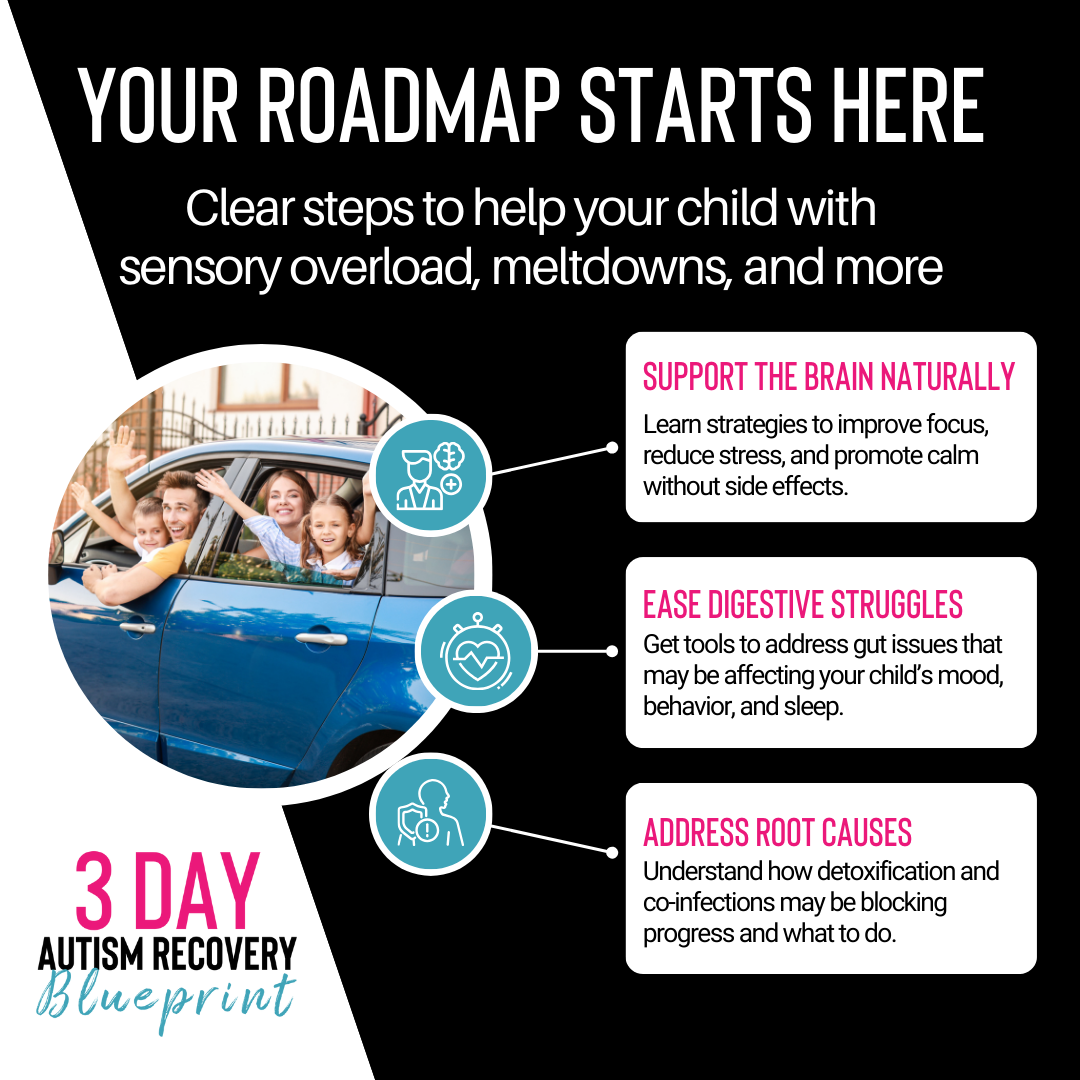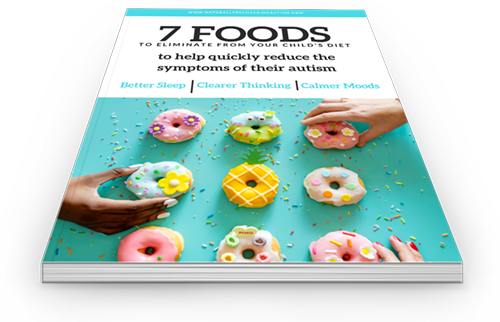What is leaky gut syndrome and why should a parent with autism be knowledgeable about it? Leaky gut is just as it sounds…the gut, or intestinal lining has holes that have been torn in it. These holes allow undigested foods into the bloodstream where the immune system sees them as toxic agents to attack.
From this immune response we end up with multiple allergies to foods and a cascade of inflammation that creates a myriad of health issues, including deregulating brain function affecting sleep, mood, appetite, ability to focus and learn, malabsorption of nutrients, depleted minerals, and overall systemic toxicity from foods and pathogenic bacteria. Let’s take a look at each and what you can do about it.
Some common causes of leaky gut
- Gluten (the protein in wheat) causes intestinal permeability. Also know that gluten free does not mean it’s healthy. Processed carbohydrates turn to sugar in the body and contribute to allow pathogenic bacteria to thrive. Sugars are also inflammatory.
- Glyphosate is the harmful herbicide that is sprayed on our food crops, especially wheat, and it destroys the gut lining.
- Casein is the protein in cow’s milk. Cow’s milk contains the bad A1 protein, has a lot of natural sugar in it and like gluten, it is inflammatory. Additionally, gluten and casein create opiates in the body so your child becomes addicted to them.
There are many foods to remove from the diet to help prevent leaky gut and allow your child’s gut to heal. Get your free guide to the top 7 foods to avoid.
The good news is that once the gut is healed you can see a natural allergy elimination practitioner who can desensitize your child to the foods they have become allergic to.
- Non-steroidal, non-inflammatory medications (NSAIDS): Beware of using any non-steroidal,non-inflammatory medications (NSAIDS), like aspirin or amphetamines. They are known to weaken the gut lining.
- Lower stomach acid (HCL): Contrary to common belief those with acid reflux are actually in need of more hydrochloric acid (HCL). Too little HCL can inhibit the absorption of vital nutrients such as B vitamins and iron causing additional fatigue. PANDAS, a strep infection can live in the gut when HCL is low. HCL helps to kill off the strep but when HCL is low the strep can survive and thrive. Any quality product containing betaine and pepsin will assist in building HCL. This will also help reduce fatigue and dizziness after meals. Betaine with pepsin can be found at most health food stores and on many online sites.
- Digestive enzymes are also helpful to take about 20 minutes before meals to assist digestion.
Pathogenic bacteria that contribute to leaky gut
Candida or Yeast overgrow in the intestines and can attach itself to the wall of the intestines, creating holes that allow undigested foods and other toxins to enter the bloodstream. The toxic alcohol, acetaldehyde, released from candida prevents T4 from becoming T3, which are components of healthy thyroid function. Cleaning up the gut and being gluten free are great ways to assist balancing the thyroid.
Mold biotoxins and lowered MSH
Mold biotoxins create chronic inflammation that can suppress melanocyte stimulating hormone (MSH), and its pathways. MSH regulates the pituitary, and therefore, your hormones. It also has anti-inflammatory functions. Lowered MSH reduces the production of melatonin which affects sleep. The production of endorphins is suppressed which can lead to chronic pain.
Further, lowered MSH can cause leaky gut which inhibits the absorption of nutrients from food, weakens and deregulates the immune system. The regulation of cytokine response by white blood cells which lowers the body’s ability to fight infections. Your level of MSH usually correlates with your level of energy. Usually, the lower your levels of MSH are, the lower your energy is. Low MSH can also result in lowered resistance to Staphylococcus bacteria colonizing in the nasal pathways. The symptoms of the mold biotoxin illness, or chronic inflammation, mimic many other autoimmune diseases.
Lyme Disease
Lyme disease have bacteria such as bartonella and babesia. These bugs do not leave easily and they affect multiple systems in the body. Antibiotics alone have been disappointing in the treatment of Lyme disease. A broad-based treatment that affects all co-infections and assists the body on multiple levels is necessary.
Most parasites live with us harmoniously, until the gut flora weakens to the point that they become a problem.
The problems caused by parasites do not come from the bugs themselves but from the existing co-infections in the body. Parasites bring with them bacteria, viruses and fungi. Viruses in the nervous system often come from Staphylococcus and lungworm (see below). When parasites are present the immune system is even weaker and the child more susceptible to bacterial and viral infections. Leaky gut allows the parasites to enter the bloodstream and make their way to organs including the brain. Parasites often live inside the mucosa of the intestinal lining, but are capable of living outside of the intestines.
We see this commonly in malnourished children or a failure to thrive, even though they may be eating properly. Mouthing is usually malnourishment while nail biting is commonly a symptom of parasites, is teeth grinding. Symptoms range from skin rash, itching, wheezing, and coughing, to leaky gut and other intestinal problems, including ulcers. Diagnosis can be difficult. The amount excreted by the body varies greatly, so it is relative to the amount excreted during a test.
Join the Autism Recovery Blueprint for Parents of Children with Autism
Discover natural strategies to improve your child’s communication, social skills, behavior, and overall well being during this FREE 3 day action plan.
JANUARY 21-23, 2026
9 AM PT | 12 PM ET
1-HOUR DAILY FOLLOWED BY LIVE Q&A
Navigating the realm of autism can be challenging. I know I’ve lived it, too. But you don’t have to do this alone. For the sum of zero dollars, you can join our community of dedicated parents who are actively shaping brighter futures for their children through this enriching 3-day experience. It is my gift to help ease your journey.
Our 3-Day Autism Recovery Blueprint serves as a guiding light on your journey, offering affordable, proven strategies and the support of a caring community.
This is for informational purposes only and is not meant to diagnose or treat. Every child’s level of recovery is different. No two people are the same. It is never implied that all children will have the same outcome. Results are all based on individual biology and the work that is done. This process takes time and various steps, effort and resources need to be weighed. Our programs are intended to help you become more knowledgeable and guide you to help bring your child a better quality of life, whatever that may be. We want to help by giving great content, direction and strategies that move you forward. Nothing on this page or any of our websites is a promise or guarantee of results or future outcomes. The results on this page and any of our websites are not typical or promised. In fact, there will be people who purchase this and other programs and never put the work into implementing the strategies taught and therefore will achieve little to no results. Our more detailed earnings disclaimer, privacy policy, and terms and conditions for this program and website can be accessed via the links below. We hold ourselves (and you) to a high standard of integrity. We are cheering you on every step of the way.












